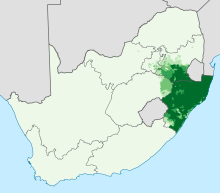Zulu (language)
| Zulu | |
|---|---|
| isiZulu | |
| Native to | South Africa, Zimbabwe, Lesotho, Malawi, Mozambique, Swaziland |
| Region | KwaZulu-Natal, eastern Gauteng, eastern Free State, southern Mpumalanga |
|
Native speakers
|
12 million (2011 census) L2 speakers: 16 million (2002) |
|
Latin (Zulu alphabet) Zulu Braille Arabic |
|
| Signed Zulu | |
| Official status | |
|
Official language in
|
|
| Regulated by | Pan South African Language Board |
| Language codes | |
| ISO 639-1 | zu |
| ISO 639-2 | zul |
| ISO 639-3 | |
| Glottolog | zulu1248 |
S.42 |
|
| Linguasphere | 99-AUT-fg incl. |

Proportion of the South African population that speaks Zulu at home
0–20%
20–40%
40–60%
60–80%
80–100%
|
|
| The Zulu Language | |
|---|---|
| Person | umZulu |
| People | amaZulu |
| Language | isiZulu |
| Country | kwaZulu |
Zulu (Zulu: isiZulu) is the language of the Zulu people, with about 10 million speakers, the vast majority (over 95%) of whom live in South Africa. Zulu is the most widely spoken home language in South Africa (24% of the population), and it is understood by over 50% of its population. It became one of South Africa's 11 official languages in 1994.
According to Ethnologue, it is the second most widely spoken of the Bantu languages, after Shona. Like many other Bantu languages, it is written with the Latin alphabet.
In South African English, the language is often referred to by using its native form, isiZulu.
Zulu migrant populations have taken it to adjacent regions, especially Zimbabwe, where Zulu is called (Northern) Ndebele.
Xhosa, the predominant language in the Eastern Cape, is often considered mutually intelligible with Zulu.
Maho (2009) lists four dialects: central KwaZulu-Natal Zulu, northern Transvaal Zulu, eastern coastal Qwabe, and western coastal Cele.
The Zulu, like Xhosa and other Nguni people, have lived in South Africa for a long time. The Zulu language possesses several click sounds typical of Southern African languages, not found in the rest of Africa. The Nguni people have coexisted with other Southern tribes like the San and Khoi.
Zulu, like most indigenous Southern African languages, was not a written language until the arrival of missionaries from Europe, who documented the language using the Latin script. The first grammar book of the Zulu language was published in Norway in 1850 by the Norwegian missionary Hans Schreuder. The first written document in Zulu was a Bible translation that appeared in 1883. In 1901, John Dube (1871–1946), a Zulu from Natal, created the Ohlange Institute, the first native educational institution in South Africa. He was also the author of Insila kaShaka, the first novel written in Zulu (1930). Another pioneering Zulu writer was Reginald Dhlomo, author of several historical novels of the 19th-century leaders of the Zulu nation: U-Dingane (1936), U-Shaka (1937), U-Mpande (1938), U-Cetshwayo (1952) and U-Dinizulu (1968). Other notable contributors to Zulu literature include Benedict Wallet Vilakazi and, more recently, Oswald Mbuyiseni Mtshali.
...
Wikipedia
